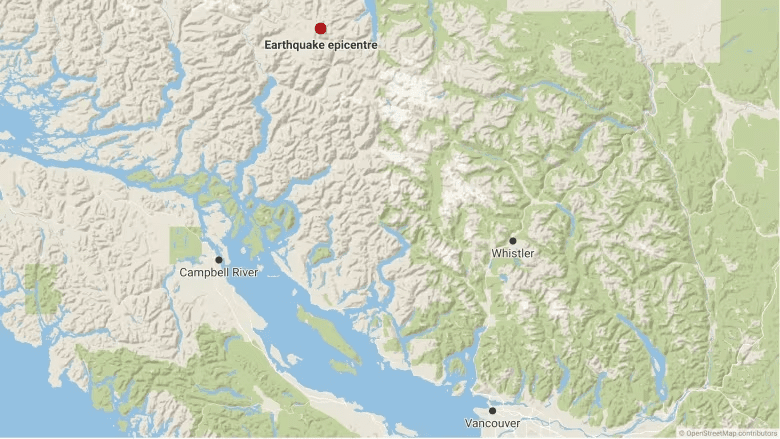
A slight earthquake with a magnitude of 4.9 occurred on Sunday in the Coast Mountains of British Columbia, approximately 222 kilometers northwest of Vancouver, as reported by Earthquakes Canada. The seismic activity was captured by Datawrapper and Arrthy Thayaparan of CBC.
On Sunday afternoon, residents in various areas of British Columbia experienced the effects of a minor earthquake that occurred in the Coast Mountains, approximately 220 kilometers north of Vancouver. According to Earthquakes Canada, the quake, recorded at 3:23 p.m. PST, had a magnitude of 4.9. Fortunately, there have been no reports of damage or secondary impacts, such as landslides.
John Cassidy, a seismologist with Natural Resources Canada, noted that earthquakes are infrequent in the central part of the province's coastal mountain range. The last recorded earthquake in this region was a 4.1 magnitude quake in 2017. Cassidy mentioned that the recent earthquake appears to be relatively shallow, accompanied by several small aftershocks in the magnitude range of one to two and a half. Aftershocks, he explained, may occur hours or days after the initial quake but tend to decrease in frequency over time.
The seismic activity was felt over a broad area of the province, reaching as far as northern and central Vancouver Island and extending over 350 kilometers to Kelowna, well beyond the quake's epicenter. Lara Lares, residing in the Nemiah Valley approximately 40 kilometers from the epicenter, recounted the sudden jolt she and her mother felt in their kitchen. She described witnessing horses in their backfield reacting with unexpected urgency, sprinting across the field. Although the earthquake lasted only four to five seconds and caused no property damage, Lares emphasized the lasting impact on her family and the horses, expressing a sense of unsteadiness on what should be solid ground.
"I've never felt so unsteady while standing on solid ground," she remarked, revealing the heightened nervousness of her dogs and the jumpy behavior of the horses, which kept their distance in the aftermath.
Seismologist Cassidy characterized Sunday's earthquake as minor on a global scale but emphasized the importance of being prepared for seismic events. Acknowledging the relative infrequency of such incidents, he highlighted the significance of knowing how to respond, advising residents to "drop, cover, and hold on" when faced with an earthquake. The event serves as a poignant reminder that British Columbia lies in an active earthquake zone, urging residents to stay vigilant and ready for potential seismic activity despite its sporadic occurrence.















